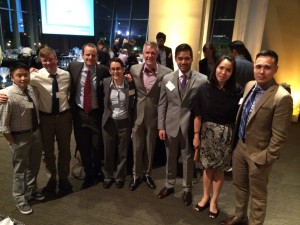Last April, Nike USA, Inc. filed a complaint against Boris Berian, alleging that the defendant had breached an endorsement contract.
Nike alleged that parties had entered into a Track & Field Contract on June 17, 2015, that ended on December 31, 2015. During this term, Berian was exclusively obligated to endorse Nike athletic footwear and apparel. During the 60-day period before the expiration of the contract, Nike had an exclusive period to negotiate the renewal of the contract. After the exclusive negotiating period ended, Berian could negotiate with third parties. However, for 180 days after the contract expired, Berian had to submit to Nike any third-party offer he received and wanted to accept, and Nike then had 10 business days to “decide whether to enter into an agreement with Defendant on terms no less favorable than the ‘material, measurable and matchable terms’ contained in that third-party offer.”


 Ohhhhh
Ohhhhh  The famously versatile hot sauce Sriracha may be in legal hot water. Its manufacturer, Huy Fong Foods, Inc., is facing a public nuisance lawsuit brought by the town in which its manufacturing facility resides. According to the complaint, odors and irritants from the facility are causing physical harm and discomfort to the residents of the town of Irwindale. The city allegedly received several complaints about the facility and as a result arranged to meet with a representative from the company to address the problem. Although the representative reportedly agreed to take measures to correct the problem, there was no change in the emanation of offensive odors from the factory.
The famously versatile hot sauce Sriracha may be in legal hot water. Its manufacturer, Huy Fong Foods, Inc., is facing a public nuisance lawsuit brought by the town in which its manufacturing facility resides. According to the complaint, odors and irritants from the facility are causing physical harm and discomfort to the residents of the town of Irwindale. The city allegedly received several complaints about the facility and as a result arranged to meet with a representative from the company to address the problem. Although the representative reportedly agreed to take measures to correct the problem, there was no change in the emanation of offensive odors from the factory. The Missouri Supreme Court, sitting en banc, issued a decision yesterday that, on its face, seems like a defeat for proponents of same-sex marriage in that state. In
The Missouri Supreme Court, sitting en banc, issued a decision yesterday that, on its face, seems like a defeat for proponents of same-sex marriage in that state. In  Asiana Airlines announced today that it plans to sue a San Francisco television station for
Asiana Airlines announced today that it plans to sue a San Francisco television station for  The media has been closely following the criminal trial of George Zimmerman, the racially charged trial in which Zimmerman is accused of murdering teenager Trayvon Martin. Just this week, a jury of six was chosen.
The media has been closely following the criminal trial of George Zimmerman, the racially charged trial in which Zimmerman is accused of murdering teenager Trayvon Martin. Just this week, a jury of six was chosen. Last week, Public.Resource.Org, through their counsel at the Electronic Frontier Foundation, filed an action for declaratory judgement against the Sheet Metal and Air Conditioning Contractors’ National Association, Inc. [SMACNA]. In its complaint, Public.Resource.org asserts that since SMACNA’s copyrighted standards were explicitly incorporated into federal and state law, they have become part of the public domain and are no longer subject to copyright restrictions.
Last week, Public.Resource.Org, through their counsel at the Electronic Frontier Foundation, filed an action for declaratory judgement against the Sheet Metal and Air Conditioning Contractors’ National Association, Inc. [SMACNA]. In its complaint, Public.Resource.org asserts that since SMACNA’s copyrighted standards were explicitly incorporated into federal and state law, they have become part of the public domain and are no longer subject to copyright restrictions.
 Google and AOL were sued for patent infringement Thursday by New Jersey-based Suffolk Technologies, LLC over their Internet search summary descriptions, or
Google and AOL were sued for patent infringement Thursday by New Jersey-based Suffolk Technologies, LLC over their Internet search summary descriptions, or